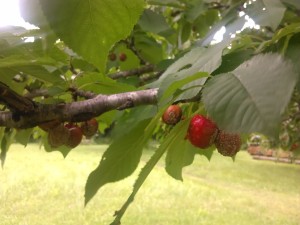No tree bears bad fruit, nor again does a bad tree bear good fruit . . . Everyone who comes to me, and hears my words and does them, is like a man building a house, who dug deep and laid the foundation on the rock. And when a flood arose, the stream broke against that house and could not shake it. Luke 6:43, 47-48
About fifteen years ago, when we moved to this plot of ground, we planted a cherry tree . It’s a good-looking tree, and most years, around this time of year it starts producing good-looking cherries. But just as they’re turning ripe, this happens:
To the best we can determine, it’s brown rot fungus, a condition that sounds as ugly as it looks. It’s fixable, but not easily. So we haven’t done anything about it yet.
Rot in the heart is hard to fix, too, and hard to completely hide. But it always shows itself sooner or later. Deep at the root of me is an unspoken conviction that I’m actually the most important person in the world, and sometimes—when I’m pressed or upset, or haven’t met three out of five of the goals I set for myself that day—I’m angry that others don’t recognize my importance. Doesn’t the old man driving 50 mph ahead of me on this twisty country road realize I’m in a hurry? Don’t the shoppers chatting in aisle 10 of WalMart understand they’re in my way? Why doesn’t the woman at the Post Office see that she’s standing right in front of my PO Box? Did she have to get here the same moment I did?
Of course, I only think that way when I’m stressed. It’s not the real me. Except, according to Jesus, it is. These moments are bad-fruit alerts.
Yeah, sure, I’m trying to get better, and sometimes nobler reactions assert themselves. And yet, “a man’s words flow out of what fills his heart” (6:45). Anger, resentment, pride, greed, and envy lurk within my heart, and sometimes they pop up and try to look like legitimate grievance. But soon enough the rot shows.
As I mentioned, the treatment for brown rot fungus is difficult: you have to cut off all the diseased twigs and fruit (called “mummies”—cute), and you can’t just rake them up in a pile. You have to burn them. Then apply a fungicide to the decimated tree, according to the manufacturer’s instruction. It may take more than one application; you’ll have to wait a year and see if the fungus comes back. “Prevention is the best treatment,” the websites say–which doesn’t help me a lot now.
Prevention (to switch metaphors) is like building a house. A wise man will select his ground carefully, then mark it out and dig down to bedrock before laying stones for a foundation. If you hear my words and do them, Jesus says, your house will rest on just such a foundation, and no storm will shake it. His disciples may have scratched their heads at that, because what he had been talking about up to that time sounds just the opposite of prudent. Love your enemies, smile when people spit at you, give more than you’re asked, cheerfully let yourself be taken advantage of—anybody who follows this advice (or, as Jesus puts it, Does what I say) would be lining up outside the soup kitchen in a matter of months, right? From that angle, Kingdom living looks like dumpster diving.
But maybe at the bottom of these commands is one rather large assumption: You are not the most important person in the world. I am.
That is, this man who apparently gave up a family and a permanent home in order to walk the dusty roads of a second-rate province in a corner of the world’s greatest Empire, is really the Emperor. He owns the place; he knows location better than any realtor. What he’s saying is, dig here. Build here. Live here. If you do, nothing in this world will ever shake you. Nothing.
That’s kingdom living, whether you make six figures or cash your checks at the pawn shop. It’s building your house, as the Sunday-school song goes, on the Lord Jesus Christ.
The sermon is over. He stands up, brushes off his tunic, wraps his cloak about his unremarkable frame. Immediately the Twelve are at his side, and a number of disciples tag along. The “multitude,” who came to be healed and stayed to listen, break up and go their separate ways. To most, though they might have called him “Lord, Lord,” his words rolled off like water from the proverbial duck. But there are a few who walk more slowly, their minds still back there on the plain where he spoke to them, and his words are burrowing deep and settling in. Soon they will sprout. He’s going to talk about that. But for now he’s on the road again, headed to his old stomping grounds in Capernaum, where . . . .
For the first post in this series, go here.
Next>

